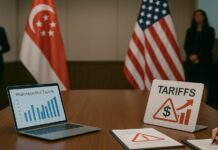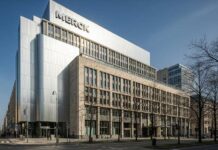Sanofi’s “factory of the future” in Singapore could be operational by the middle of the decade. One of two so-called Evolutive Vaccine Facilities (EVFs) that the French drugmaker is building with a collective investment of 900 million euros (about $976 million) has begun construction. In France, the other factory is starting up. According to the company, the EVFs will work together to pave the way for further vaccine innovation around the world.
Sanofi isn’t just invested in vaccines. The pharma giant says its two EVFs are meant to produce multiple vaccine and biologic technologies, including mRNA, enzymes, and monoclonal antibodies, with an efficient and flexible approach.
The Singapore EVF is a first-of-its-kind, fully digitised and modular vaccine production facility capable of producing injections for Asia on a massive scale, according to Sanofi, which is investing 400 million euros ($434 million). As per the firm, the facility will take advantage of Singapore’s status as a regional innovation hub for the healthcare industry. In an interview with a leading Singapore daily, Thomas Triomphe, Sanofi’s executive vice president for vaccines, said that to go with big investments like the EVF, one needs a complete ecosystem of suppliers of raw ingredients, starters, and innovative technologies in the same area.
Sanofi currently employs over 500 people in Singapore, with plans to hire an additional 200 within the next five years as the EVF project moves forward. According to the company’s press statement, the Singapore plant is projected to be completed by the end of 2025.
The Singapore EVF is based on a core unit that is made up of many fully digitised modules, according to Sanofi, and is designed to react to ongoing and prospective public health problems. Those modules will be capable of producing up to four vaccines at the same time. Sanofi claims that this is valid, independent of the vaccination technology utilised, whether it’s protein, mRNA, or perhaps any other platform. Besides that, the site will be set up so that it can quickly switch to a single vaccine procedure to boost supplies and respond to changes in public health needs, like a pandemic.
They understand that COVID-19 will not be here forever, Triomphe added. With all these evolving facilities, they are already sowing seeds and planning for the next outbreak, and that’s the degree of agility one will need. GlaxoSmithKline was the sole vaccine manufacturer in Singapore prior to the outbreak. According to the daily, that facility has been producing components for GSK’s children’s bacterial vaccinations since 2011. Thanks to the COVID-19 outbreak, this appears to be changing. Apart from Sanofi, Pfizer’s German ally BioNTech and mRNA competitor Moderna have both hinted at intentions to open offices in the Southeast Asian country.
Last May, BioNTech revealed plans for a Southeast Asia regional base in Singapore that will feature a high-tech mRNA manufacturing facility. According to the company at the time, the plant would ultimately have a capability of several hundred million mRNA vaccine doses each year.
Moderna announced intentions in February to open four new affiliates in Hong Kong, Malaysia, and Singapore, as well as Taiwan, to expand its Asian footprint. In a press statement earlier this year, Moderna stated that the continent is now an integral part of the company’s operations. Moderna’s Singapore shareholding appears to be less concentrated on manufacturing so far.


















